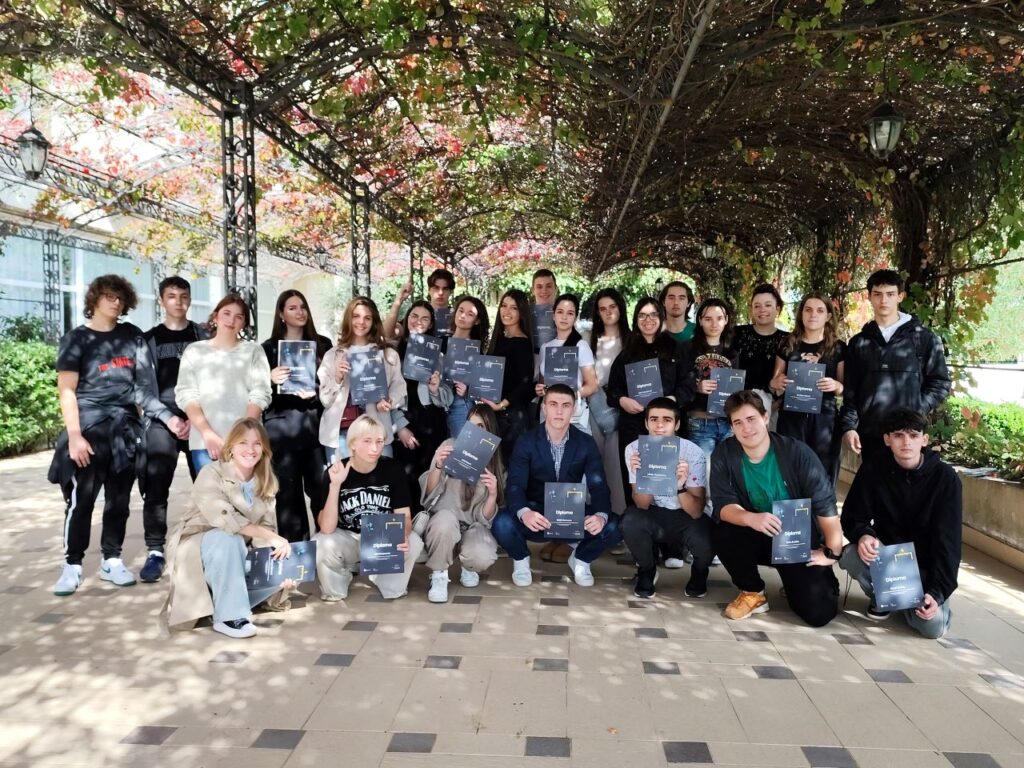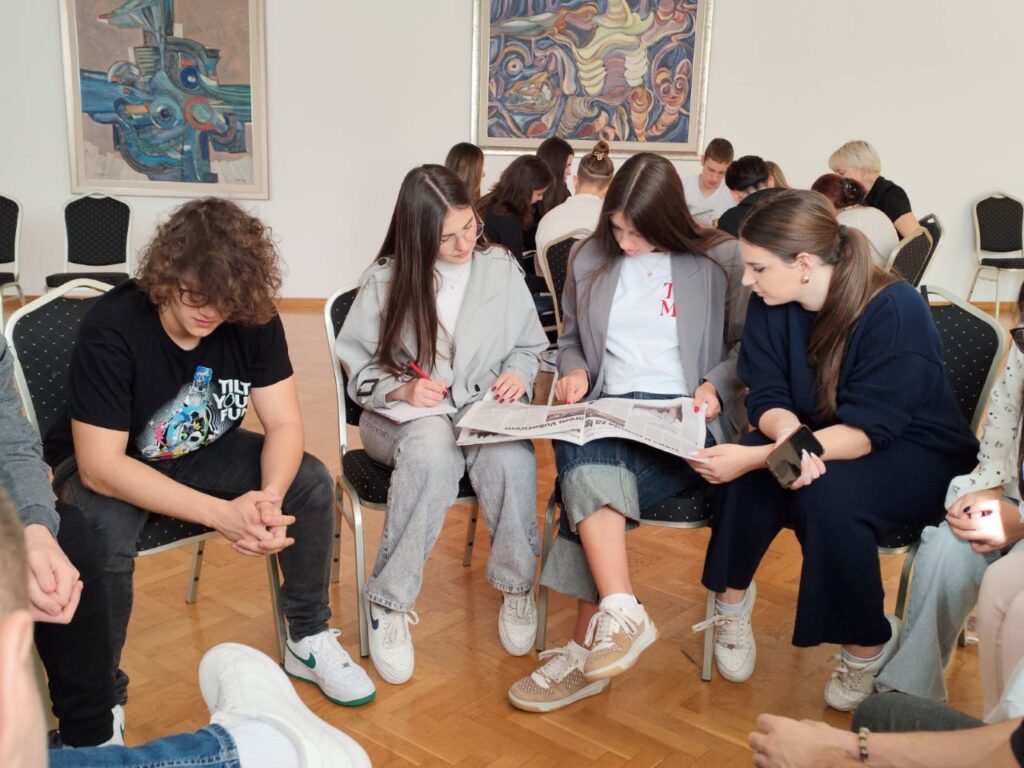Centre for Civic Education (CCE) organized the 27th generation of the Human Rights School with a focus on gender equality, from 18 to 20 October 2024 in Budva, as part of the project “Against Gender Stereotypes and Sexism!” supported by the Ministry of Human and Minority Rights.
During the School, 23 high school students had the opportunity to enhance their knowledge and understand the importance of advocating for gender equality. They also analyzed the obstacles to its establishment in Montenegrin society, such as gender-based violence, entrenched stereotypes and prejudices, sexism, misogyny, hate speech, and gender discrimination in both real life and online spaces—topics that are either not taught at all or insufficiently addressed in the formal education system.
“This year’s Human Rights School focused on gender equality, creating space for an open conversation with young people about the challenges they face in this area. A part of the programme addressed the digital environment, where young people are often exposed to dangers without being aware of them. Through theoretical and practical work, the participants received tools to recognize and combat these issues, better understand protection mechanisms, and promote the values of gender equality within their surroundings,” said Maja Marinović, programme associate at CCE and project coordinator for “Against Gender Stereotypes and Sexism!”.
“The issue of gender-based violence, often associated with adults, begins as early as in the womb, which is evident in the practice of selective abortions in Montenegro. Increasing forms of gender-based violence among young people include sexual and partner violence, as well as the misuse of intimate photos, videos, and messages… The consequences of such abuse are severe, especially for the psychological and emotional development of young people, who, during puberty, struggle with self-acceptance, and violence further disrupts this process,” emphasized Aida Perović, Executive Director of the NGO Prima. She pointed out that these forms of violence have intensified during the pandemic and are intertwined with a historical and political context that advocates so-called traditional values. “We must focus on prevention, as it directly and indirectly prevents young people from becoming victims of domestic violence in the future,” concluded Perović.
“Young people who want to re-examine their views, knowledge, beliefs, and practices about human rights, with a focus on gender stereotypes and sexism, should attend the Human Rights School organized by CCE. Through socializing and learning, they will expand and enrich their knowledge, contributing more effectively to the development of a civic society. Only those who are gender-conscious will be ready to recognize gender-based discrimination, oppose it, and build a society of equal opportunities. The young men and women attending this school are prepared to create a civic and gender-equal Montenegro,” said Nada Drobnjak, former Chairwoman of the Committee for Gender Equality in the Parliament of Montenegro.
” This School provides young people with the opportunity to learn about basic rights, principles of justice, and social equality, and understanding and applying these concepts is key to creating equal opportunities for all. Here, they learn about different generations of human rights—civil, political, economic, social, and cultural rights, as well as collective and environmental rights—and how to distinguish and apply them through practical work. The approach of this School is particularly important as it does not merely impart theoretical knowledge but encourages young people to think critically and actively contribute to building a more just society,” stated Tamara Milaš, human rights activist.
Participants of the Human Rights School also shared their impressions.
“I applied to the Human Rights School because I believe education is the key to changing and improving society. This School means a lot to me because it provides an opportunity to gain a deeper into issues of justice, equality, and human rights. I was particularly inspired by the part of the programme on sexist and misogynistic speech, as it demonstrates how language can influence social norms,” said Eva Radunović, a student at Petar I Petrović Njegoš High School in Danilovgrad.
“My desire to expand my circle of people with whom I can discuss important social topics motivated me to apply for the Human Rights School. I was especially interested in gender equality, and the debate on this topic stood out as a particularly valuable session because it allowed me to view the issue from multiple perspectives and deepen my understanding of this complex subject,” noted Matija Marković, a student at Golubovci Secondary Mixed School.
“I wanted to learn more about human rights and gender equality, which is why I applied, but also to meet new people, even those who do not think like I do. The School I changed some of my views and become more informed. It also helped me recognize where I myself make mistakes and have prejudices that I am trying to fight against,” said Alina Sergienko, a student at the Secondary School of Fine Arts in Cetinje.
“When I first considered applying to CCE’s School, I didn’t realize how much I would impress me. My main motivation for enrolling was the lack of education on these topics in high school, which underscores the importance of CCE’s efforts to disseminate this valuable knowledge,” said Mitar Ćurčić, a student at “Vaso Aligrudić” Electrical Engineering High School in Podgorica.
“The School was beneficial because I learned new things that I will share with my peers. It was very interesting, and I especially liked the topics related to human rights, hate speech, misogyny, and feminism,” shared Una Perazić, a student at “Podgorica” Gymnasium.
“This School means a lot to me because, in a short time, I realized how many useful things I could learn. The name of the School itself motivated me, and I found the topics on gender equality particularly interesting. I deepened my understanding of key social issues and learned how to actively engage in addressing them,” summarized Danira Zaimović, a student at “Miloje Dobrašinović” Gymnasium.
The lecturers and workshop facilitators at the Human Rights School were human rights activists and experts, and the 27th generation was successfully completed by: Anastasija Rešetar, Uroš Đurišić, Una Perazić, Nikola Arsović, Milica Kaluđerović, Danira Zaimović, Matija Marković, Anna Gomenjuk, Adela Stanić, Anja Malešić, Vuksan Ćetković, Sara Iljazi, Andrijana Maraš, Bogoljub Džankić, Eva Radunović, Marija Anđelić, Luka Nikolić, Miloš Ognjanović, Vuk Vuksanović, Alina Sergienko, Hamza Avdić, Mitar Ćurčić, and Manja Perić.
Marlena Ivanović, Programme Associate




